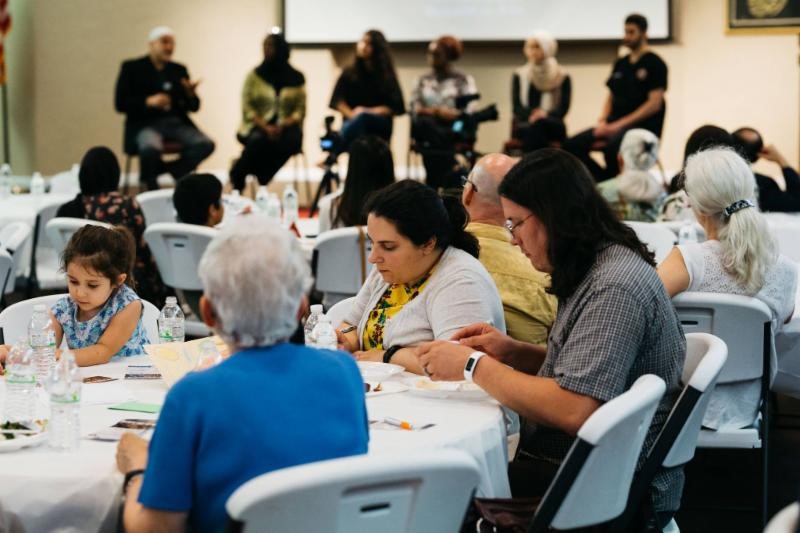Temperatures across the state aren’t typically as hot in the spring and early summer as they are in the fall, but when it comes to observing Ramadan fairly early in the year, heat isn’t always a factor, a local Muslim leader said recently.
Ramadan, the Islamic holy month of fasting, is one of the five pillars, or obligations, of Islam. Many Muslims around the world abstain from food, drink and sensual pleasures from dawn to sunset during the month, which commemorates the divine revelation of the Quran to the Prophet Muhammad.
Imad Enchassi, senior imam of the Islamic Society of Greater Oklahoma City, said he and many other Muslims are not concerned about fasting in heated temperatures.
However, they actually fast for longer periods of time when Ramadan falls during spring and summer because the days are longer.
He said some non-Muslims seem to get the impression that the month of fasting is a hardship, then, but Enchassi looks at it as more opportunities to reflect on God.
“I say think of it as spending time with the beloved — the longer the better,” he said.
Ramadan begins at sundown Tuesday. Enchassi said the first full day of fasting will be Wednesday.
The Islamic calendar follows the lunar cycle, which is shorter than the sun-based Gregorian calendar, so Ramadan moves up 11 days every year. Ramadan can last 29 or 30 days, depending on the lunar cycle. For some Muslims, the exact date is uncertain until they see the new moon. Ramadan 2017 was May 26 through June 24. The holy month of fasting was observed from June 6 through July 5 in 2016 and from June 17 through July 17 in 2015.
Enchassi said he and several metro-area Muslim leaders will be spending time at events designed to share the holy days with the community-at-large and to educate non-Muslims about Ramadan.
The Islamic Society and the Council on American-Islamic Relations-Oklahoma chapter have planned several outreach activities that will include fellowship, education and food.
Both organizations will partner to host an event entitled “Revealing Ramadan: A Look-in on the Muslim Month of Fasting” on May 22 at the Islamic Society’s Mercy Mission Center, adjacent to the society’s mosque. The free event will feature a discussion about Islam and Ramadan and food from several area restaurants.
Visitors will join Muslims for Iftar, the sundown meal that breaks the Ramadan fast.
“It’s a great event for them to come to if they have never been to a mosque,” Enchassi said.
Adam Soltani, executive director of CAIR-OK, agreed.
“We always want to offer opportunities for people to come and learn about our faith. Plus, we’ll treat them to good food,” he said.
Soltani said the Muslim advocacy group also will sponsor the Muslim community’s annual Ramadan Day of Service at the Regional Food Bank of Oklahoma on June 2.
CAIR-OK also will host its annual “Iftar With Legislators” event, which brings the metro-area Muslim faith community and interfaith partners together with state lawmakers for an evening of dialogue. The event, set for June 8, culminates with an Iftar meal.
Meanwhile, the Dialogue Institute will host an “Interfaith Iftar Dinner” on May 26 featuring Oklahoma City Mayor David Holt as guest of honor speaker. The event will include a presentation entitled “Ramadan, Fasting and Beyond” presentation and a question-and-answer session.
Both Enchassi and Soltani said they enjoy interacting with community members who are interested in learning more about Ramadan, Islam and their Muslim neighbors.
They noted that last year, many Ramadan events were hosted by the houses of worship of other faith traditions last year, and an institution of higher learning — Oklahoma City University — held one, as well.
Enchassi said the Dialogue Institute sponsored several of the events in partnership with several metro-area churches and one Jewish house of worship, Temple B’nai Israel.
“I do appreciate that they are allowing us into their holy place to share not only a meal with them but to share our faith,” Enchassi said.
Soltani said the interactions at the Ramadan event are worthwhile.
“It’s wonderful to see that not only as a Muslim community, we’re able to invite people of other faiths in to share our experiences, but it’s great to see others — Jewish and Christian faith communities and academic institutions willing to host the Muslim community,” he said.
“It reminds us that we belong in the state we live in.”

